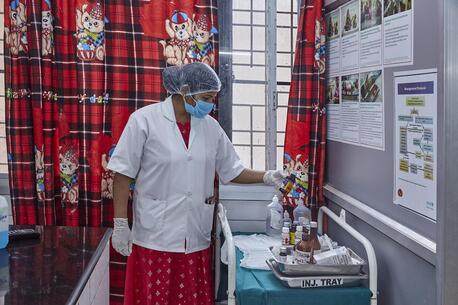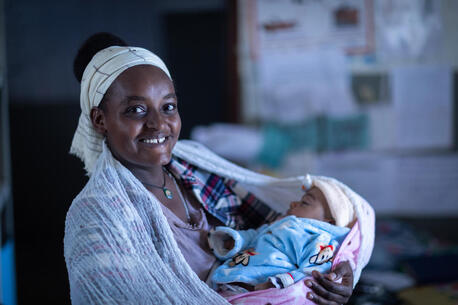
Beyond COVID-19: UNICEF's Push to Improve Primary Health Care
How can the world prepare for future pandemics? By building better health systems in ways that strengthen primary health care globally. UNICEF is advocating for greater investment in these pivotal areas.
With the world well into its third year fighting COVID-19, UNICEF has launched a broader push to strengthen health systems around the world to protect against future pandemics.
While systems strengthening has always been integral to UNICEF’s work, the far-reaching impacts of COVID-19 — the millions of lives lost, the economic and social disruptions, a deepening learning crisis for a generation of students — shows the enormity of what's at stake, and has served as a stark reminder of the need to build resilient health systems globally.
Here are five areas UNICEF has identified as priorities to focus on, and why:
1. Recruit, train and prioritize health care workers
As the heart of any strong health care system, health care workers must be prioritized and supported — professionally, financially and emotionally. This includes building their confidence, ensuring their thoughts and concerns are understood and working with them to address those issues.
UNICEF works to increase the capacity of health workers by providing training led by UNICEF experts and supporting governments so that they can establish their own training services. UNICEF also supports psychosocial support efforts to respond to health worker mental health challenges and to promote resilience — recognizing the physical and emotional strain of the past two years.
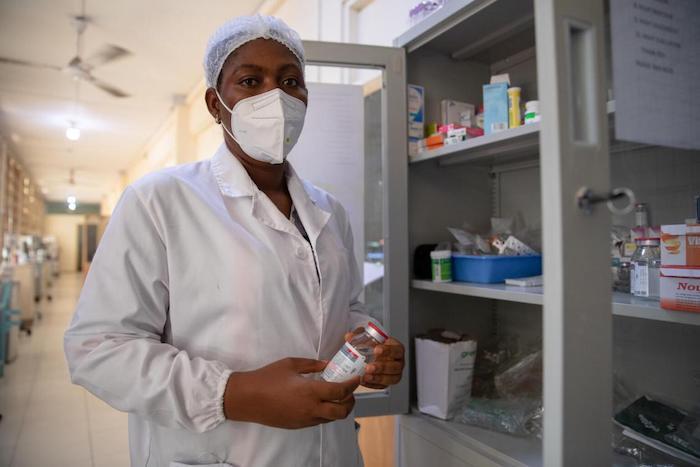
Jennifer Boateng, Senior Pharmacist at Greater Accra Regional Hospital in Ghana, has been working in the COVID-19 intensive care unit during the pandemic, making sure that COVID-19 patients get the medication they need. "Gathering the courage to come to work each morning takes great effort and mental preparation,” she said. © UNICEF/UN0588460/Kokoroko
Jennifer Boateng, Senior Pharmacist at Greater Accra Regional Hospital in Ghana, said working during the pandemic has had a profound impact on her.
"I was still breastfeeding when I started work at the COVID-19 intensive care unit," she recalled. "I was truly terrified of contracting the virus and putting my family at risk. Painfully, I had to stop my children from hugging me.”
Boateng has been working to make sure COVID-19 patients get the medication they need. “Working here has exposed me to the most deaths I have ever witnessed in my career, a haunting journey. Gathering the courage to come to work each morning takes great effort and mental preparation.”
As UNICEF points out: ensuring adequate support for health workers is important not only to ensure they are equipped to do their jobs, it also helps to make the profession an appealing one that can attract and retain talented and dedicated people.
2. Establish effective surveillance and response systems
During the COVID-19 pandemic, clusters of cases have emerged in different parts of the world at different times. New, sometimes more transmissible variants have regularly circulated, and they’ve often spread quickly.
With any virus that is constantly moving and changing, it’s important to have effective testing and reporting mechanisms in place to monitor them. That means that if an outbreak occurs or a new variant emerges, it can be flagged quickly to a central health authority. By raising the alarm quickly, effective measures can be quickly put in place to help limit virus transmission.
This kind of surveillance works best when it's done at a community level.
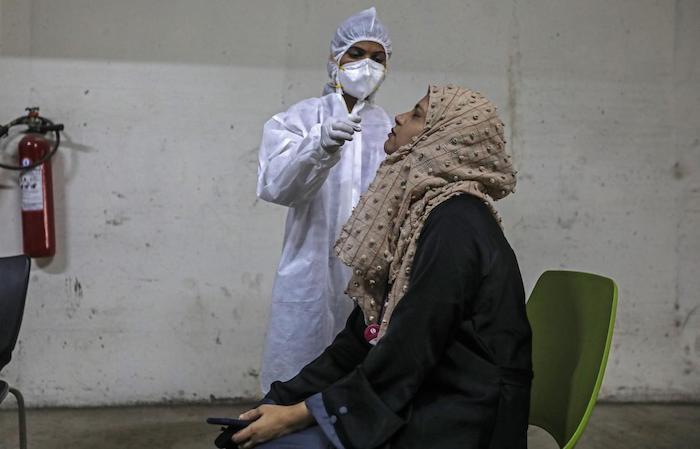
A health worker wearing personal protective equipment takes a nasal swab sample from a person to test for COVID-19 disease at a facility in the Malad area of Mumbai, India. © UNICEF/UN0457031/Bandiwadekar
Moving forward, larger investments are needed to improve testing, particularly at the community level. Many low- and middle-income countries still have limited access to and capacity for testing. Unless and until those capacities are increased, the ability to detect and contain future outbreaks will remain limited. And that means the possibility of future lockdowns, with schools and businesses closed — and all the social and economic effects that entails.
3. Build confidence in health services through community health
Trust is crucial to the success of a vaccination campaign — or any public health campaign for that matter. There must be confidence in health care workers, health institutions and national health agencies, confidence that the guidance they are providing is evidence-based and respected.
And that guidance must be communicated effectively. People need to know that vaccines are available, where to go to get vaccine doses and when vaccination workers will be administering them. Communicating this information is particularly crucial in rural communities where temporary clinics often provide these services.
In South Africa, the “Zwakala” vaccine campaign —named after the Zulu term for "come on over," a phrase often used by friends as an invitation— is an example of what can happen when trust is combined with effective messaging.
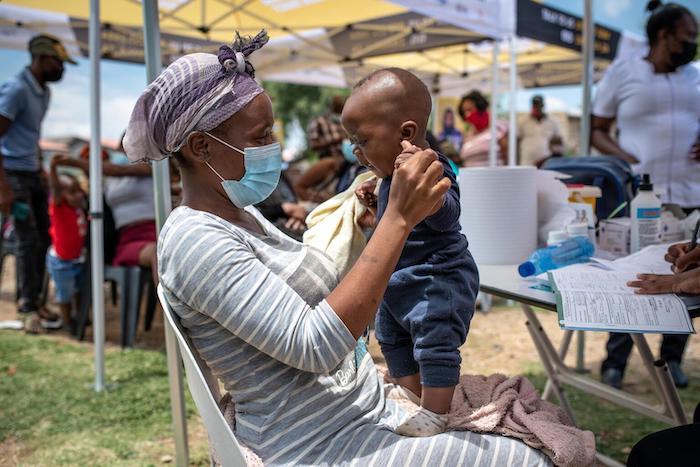
Neliswa Mnana holds her son, 6-month-old Phatu, at a pop-up vaccination site run by the Zwakala campaign in South Africa. © UNICEF/UN0595761/Paul
Through this initiative, community health care workers have been mobilizing in parts of the country where initial COVID-19 vaccination rates have been low. They’ve been communicating through various mediums, whether it’s on local radio, handing out leaflets or speaking face-to-face with members of their community.
4. Include COVID-19 vaccines in routine immunization packages
To protect communities from COVID-19, vaccines need to be easily accessible at a community level. To achieve that, COVID-19 vaccines will need to be readily available as part of routine immunization packages — offered to people as part of a regimen of vaccines throughout their lifetime.
This requires expanding and strengthening routine immunization and primary health care services to be able to serve adults, while protecting childhood immunization.
5. Strengthen logistics and supply
The challenges of developing, delivering and administering COVID-19 vaccines to end the pandemic have always been about more than the vaccine doses themselves.
Health care workers need gloves, masks and other protective gear to stay safe on the job. They need syringes. They need cold chain equipment to ensure vaccines could be stored at the proper temperature and will not go to waste.
In the Philippines, a country with disaster-prone regions and hundreds of hard-to-reach islands, there were challenges with regard to maintaining cold chain storage in the course of delivering vaccines to remote communities. In Kabugao, for example, a municipality nestled in the mountains north of Manila, extreme flooding is common and the power often goes out. To address this challenge, UNICEF and partners has supplied dozens of solar-powered refrigerators to communities like Kabugao.
Moving forward, increased investments in infrastructure of this kind will help to ensure communities can receive — and safely manage — the vaccines they need to protect against future outbreaks.
UNICEF to leverage existing partnerships and global presence to help improve responsiveness of health systems
UNICEF is uniquely placed to work with governments and other partners, the private sector and communities to improve the responsiveness of health systems in low- and middle-income countries and better address a diversity of threats to child survival and development.
UNICEF is calling on partners to seize the opportunity of the moment — not just to end the current pandemic, but to protect against future ones by building stronger health systems in these five critical ways. While UNICEF continues to support the global pandemic response supporting countries as they roll out COVID-19 tools through their national health systems, key priorities include:
- resuming and maintaining essential health care services, including for diagnosis, care,and treatment of respiratory illnesses, with a special focus on “zero-dose communities”
- promoting integrated service delivery, including to boost vaccine uptake, testing and care-seeking
- engaging communities through multiple platforms for risk communication and community engagement
- strengthening community health, data and digital health, supply chains, quality of care, and management capacity to support primary health care
- providing infection prevention and control supplies such as soap, hand sanitizer and cleaning materials for primary health care centers
- keeping health workers safe through provision of quality personal protective equipment
- ensuring that water, sanitation, and waste management infrastructure are in place and operational
Support UNICEF's work with partners to strengthen primary health care systems globally. Donate today.
Top photo: Sabrielys, 6, is vaccinated in the San Vicente community of Miranda state, Venezuela, during a UNICEF-supported national immunization campaign in September 2021. UNICEF's ongoing global pandemic response strategy includes measures aimed at helping countries strengthen their primary health care systems to ensure continuity of essential services — including vaccinations against measles, polio and other vaccine-preventable diseases — even in a crisis. © UNICEF/UN0517738/Poveda

